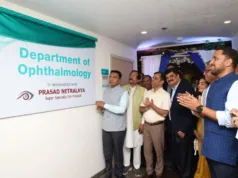Manipal Hospital Goa marked a significant milestone in advanced cancer care with the launch of Selective Internal Radiation Therapy (SIRT), also known as Transarterial Radioembolization (TARE), for the treatment of liver tumors. The event titled “SIRT – A Game Changer in Liver Tumor” was organised by Dr. Charudutt J Sambhaji, Chief of Radiology & Consultant – Interventional Radiology, and Dr. Pankaj Mhatre, Consultant – Nuclear Medicine, Manipal Hospital Goa featured leading global and national experts in oncology and interventional radiology. It signals a new frontier in the hospital’s commitment to precision and personalized cancer care, states a press release.
The highlight of the event was a keynote session on “New Frontiers in Selective Internal Radiation Therapy (SIRT)” by Prof. Dr. Pierce K. H. Chow, Professor and Program Director at Duke-NUS Medical School, Singapore, and Senior Consultant Surgeon at the National Cancer Centre, Singapore. The session was followed by an insightful discussion on “Optimizing SIRT Dosimetry and Outcome,” led by Dr. Sanjay S. Baijal, Chairman, Interventional and Diagnostic Radiology at Medanta the Medicity, Gurugram.
On this occasion, Dr Charudatt stated, “The launch of SIRT at Manipal Hospital Goa represents a quantum leap in cancer care in the region. It brings the latest international advancements in interventional oncology to our doorstep, offering new hope to patients battling complex liver cancers.”
As cancer cases are on the rise, SIRT is emerging as a key treatment for liver cancers. SIRT is a targeted treatment for liver cancers like hepatocellular carcinoma (HCC) and metastatic liver tumors. It involves delivering radioactive microspheres directly into the blood vessels that supply the tumor, allowing for precise radiation with minimal damage to surrounding healthy tissue. It is a detailed pre-procedure preparation, including lab tests, image studies, and a preliminary angiogram with a Tc-99m MAA scan to assess particle shunting. Patients are then admitted for the main procedure, which involves injecting tiny radioactive beads into the liver through its blood vessels. A short hospital stay of 1–2 days is usually needed.






